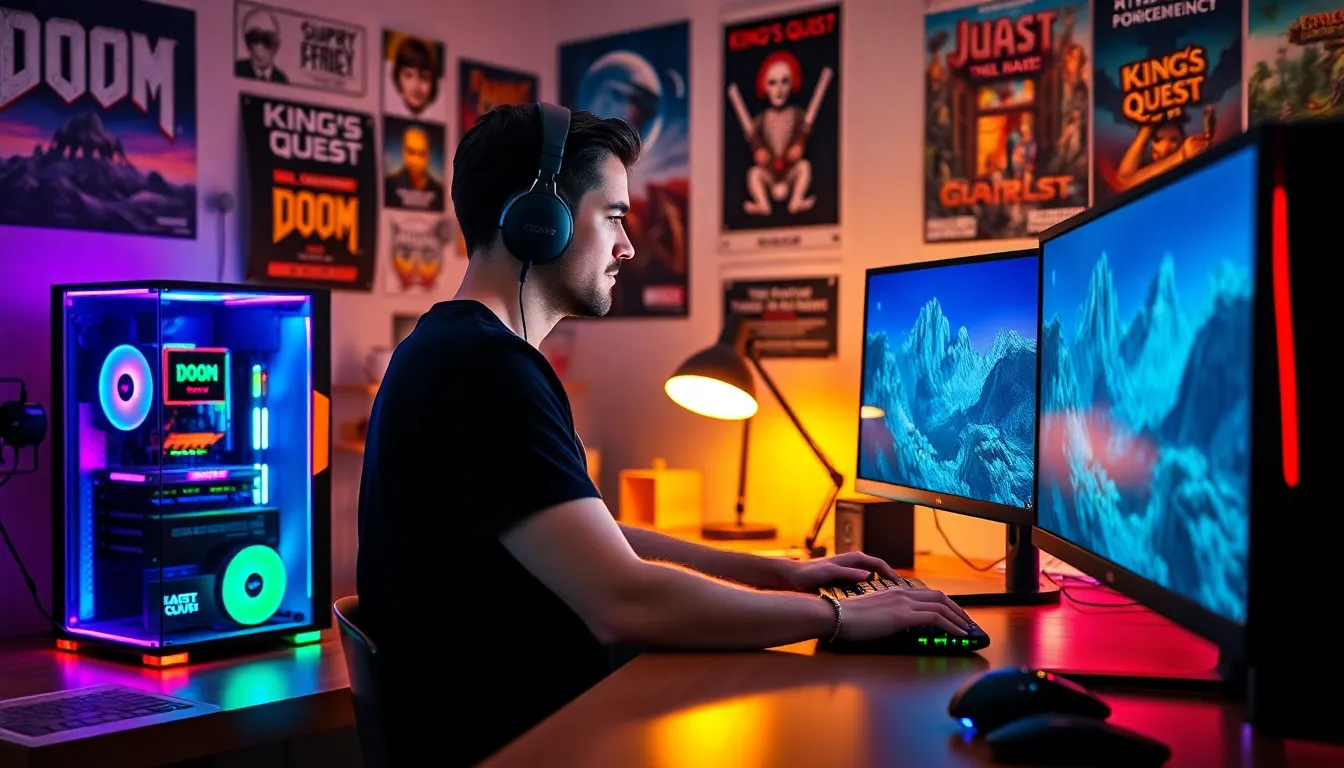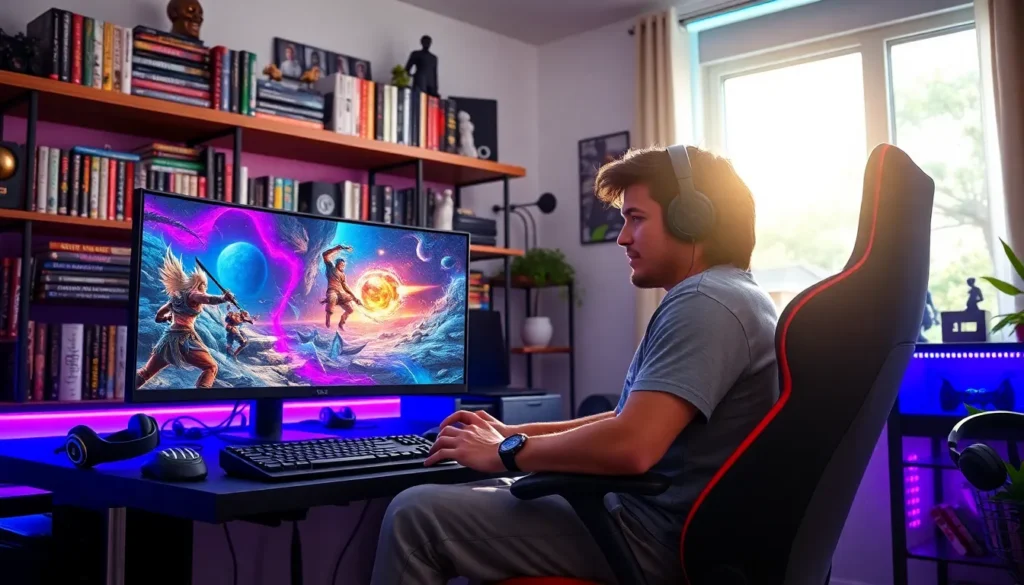In the ever-evolving landscape of gaming, PC gaming stands out as a dominant force that has shaped the industry in numerous ways. With its rich history, robust community, and the advent of innovative technologies, PC gaming continues to thrive and attract enthusiasts. This article will investigate into the evolution of PC gaming, explore the rise of indie games, examine the role of online communities, and provide tips for enhancing the gaming experience. Join in as we explore the multifaceted world of PC gaming.
Table of Contents
ToggleThe Evolution Of PC Gaming

Key Milestones In PC Gaming History
PC gaming has come a long way since its inception, marking several key milestones along the way. The journey began in the 1970s with simple text-based games like Colossal Cave Adventure that captured the imaginations of early users. The introduction of graphical interfaces in the 1980s, propelled by games like King’s Quest, set a new standard for interactive entertainment.
The 1990s were pivotal, showcasing the rise of multimedia gaming with titles such as Doom and Warcraft II, allowing players to experience immersive worlds for the first time. The launch of Windows 95 marked another significant milestone, providing a platform that encouraged more complex game development and broader accessibility.
Entering into the 21st century, technologies like DirectX transformed the way games were developed for Windows, leading to significant advancements in graphics and performance. The launch of platforms like Steam in 2003 revolutionized how games were distributed and updated, forever changing the landscape of game purchasing and ownership.
Impact Of Hardware Advancements
Alongside software innovations, hardware advancements have propelled PC gaming into new heights. The introduction of 3D graphics cards revolutionized gameplay, providing players with unprecedented levels of detail and realism.
Motherboards have evolved to support multi-core processors, enhancing performance and allowing for multitasking while gaming. As internet speeds have increased, online multiplayer experiences have become faster and more reliable, fostering a competitive landscape. Also, high-refresh-rate monitors and gaming peripherals have further refined the gaming experience, making PC gaming not only a retreat into virtual worlds but an incredibly engaging and competitive try.
The Rise Of Indie Games
Why Indie Games Matter
In recent years, indie games have emerged as a significant force within the gaming community. These titles often provide fresh perspectives, innovative gameplay mechanics, and unique storytelling that larger studios might overlook due to commercial pressures. The indie game movement encourages creativity and diversity in gaming, allowing developers to take risks and explore unconventional themes.
Indie games serve as a breeding ground for new ideas, helping to diversify the types of games available to players. They often shine a light on niche markets, ensuring that different experiences are represented in the gaming ecosystem, which further enriches the community.
Notable Indie Games To Explore
Several indie titles have made a substantial impact on the gaming landscape. Hollow Knight, developed by Team Cherry, combines beautiful art with challenging gameplay and explorative mechanics, making it a prime example of the potential of indie development. Similarly, Celeste captivates players with its poignant narrative and superb platforming controls.
Games like Stardew Valley have captured the hearts of millions by offering charming gameplay and a sense of community, proving that indie games can rival high-budget productions in terms of success and cultural significance.
The Role Of Online Communities
Building Connections Through Gaming
The rise of online gaming communities has been pivotal in shaping the culture around PC gaming. Platforms like Discord, Reddit, and various forums have created spaces where gamers can share experiences, collaborate on strategies, and form lasting friendships. These communities foster a sense of belonging and provide players with a platform to engage with others who share similar interests.
Also, gaming events such as conventions and tournaments have also seen a rise in popularity, further solidifying these connections and offering players unique opportunities to meet face-to-face and celebrate their shared passion.
The Influence Of Streaming Platforms
The emergence of streaming platforms like Twitch and YouTube Gaming has transformed how gamers interact with games and each other. Content creators have capitalized on this trend, building communities around their channels that engage millions of followers. Streaming encourages viewers not only to watch gameplay but also to participate in discussions, making it an interactive experience.
This influence has extended beyond entertainment: it has paved the way for game marketing, as many indie games find their audiences through streaming. The relationship between streamers and developers can dramatically impact a game’s success, illustrating the power of community-driven content.
Tips For Enhancing Your PC Gaming Experience
Essential Hardware Upgrades
To maximize one’s gaming experience, hardware plays an essential role. Investing in a solid graphics card can significantly impact gaming performance, allowing for higher frame rates and better graphics quality. Upgrading RAM can also enhance a system’s multitasking capabilities, ensuring that games run smoothly even with background applications.
Also, consider upgrading to an SSD for faster load times, providing a seamless gaming experience free from frustrating waits. Investing in quality peripherals, such as gaming mice and mechanical keyboards, can elevate gameplay responsiveness and comfort, making long gaming sessions much more enjoyable.
Optimal Settings For Gameplay
Optimizing in-game settings is crucial for an enhanced experience. Adjusting graphics settings to strike a balance between performance and visual fidelity can reduce lag and improve responsiveness. Many games feature presets based on the player’s hardware, allowing for easy adjustments without needing extensive knowledge of graphical settings.
Implementing proper audio settings also adds another layer of immersion. Surround sound setups or quality headphones can enhance audio cues, making gameplay more dynamic and engaging, whether in a competitive context or during exploration.
Conclusion
PC gaming continues to evolve, expanding its influence through hardware advancements, the rise of indie titles, and the growth of engaging online communities. As gamers explore this vast landscape, understanding its history and utilizing the resources available can enhance their experiences immensely. With every new game and technological advancement, the world of PC gaming beckons enthusiasts to dive deeper, connect more, and thrive in an ever-changing industry.






